Entry-Level PR Position Cover Letter
Subject: Application for Public Relations Associate Position
Dear Hiring Manager,
I am writing to express my strong interest in the Public Relations Associate position at [Company Name]. As a recent graduate with a degree in Communications and hands-on experience through internships at [Previous Company], I am excited about the opportunity to contribute to your dynamic PR team.
During my internship at [Previous Company], I assisted in developing media kits, coordinating press events, and monitoring media coverage across multiple platforms. I successfully pitched three stories that resulted in placements in local publications, and I managed social media accounts that grew engagement by 40% over six months. These experiences taught me the importance of strategic messaging, relationship building, and adaptability in the fast-paced world of public relations.
I am particularly drawn to [Company Name] because of your innovative campaigns for [specific client or project]. Your approach to integrating traditional media relations with digital storytelling aligns perfectly with my belief that effective PR requires a multi-channel strategy. I am eager to bring my creativity, attention to detail, and enthusiasm to your team.
I have attached my resume and portfolio showcasing writing samples and campaign materials I have developed. I would welcome the opportunity to discuss how my skills and passion for public relations can contribute to [Company Name]'s continued success.
Thank you for considering my application. I look forward to hearing from you.
Sincerely,
[Your Name]
[Phone Number]
[Email Address]
Experienced PR Professional Cover Letter
Subject: Application for Senior Public Relations Manager Position
Dear [Hiring Manager's Name],
With over eight years of progressive experience in public relations and a proven track record of executing high-impact campaigns for Fortune 500 companies, I am excited to apply for the Senior Public Relations Manager position at [Company Name].
In my current role as PR Manager at [Current Company], I lead a team of five professionals and oversee integrated communications strategies for clients in the technology and healthcare sectors. Notable achievements include securing over 200 media placements annually in top-tier outlets such as The Wall Street Journal, Forbes, and TechCrunch, and managing crisis communications during a product recall that maintained 85% positive sentiment. I also developed a thought leadership program that positioned our CEO as an industry expert, resulting in speaking engagements at three major conferences.
My strategic approach combines data-driven insights with creative storytelling. I believe that successful PR campaigns require a deep understanding of target audiences, strong media relationships, and the ability to adapt messaging across diverse channels. At [Previous Company], I increased media coverage by 150% year-over-year and reduced response time to media inquiries by 60% through streamlined processes.
[Company Name]'s reputation for innovative PR strategies and commitment to client excellence makes this opportunity particularly appealing. I am confident that my leadership experience, strategic thinking, and passion for building compelling narratives would make me a valuable addition to your team.
I would appreciate the opportunity to discuss how my experience aligns with your needs. Thank you for your consideration.
Best regards,
[Your Name]
[Phone Number]
[Email Address]
[LinkedIn Profile]
Career Change to PR Cover Letter
Subject: Transitioning Marketing Professional Seeking PR Opportunity
Dear Hiring Team,
I am writing to express my interest in the Public Relations Specialist position at [Company Name]. While my background is in marketing, I have developed a strong passion for public relations and believe my transferable skills make me an excellent candidate for this role.
Throughout my five years in marketing at [Current Company], I have consistently worked at the intersection of marketing and communications. I have written press releases, coordinated with media for product launches, managed brand reputation on social media, and collaborated with PR agencies on integrated campaigns. These experiences revealed my genuine interest in storytelling, media relations, and reputation management—the core elements of effective public relations.
What sets me apart is my comprehensive understanding of both marketing strategy and communications execution. I know how to align PR efforts with broader business objectives, analyze campaign performance using metrics, and craft messages that resonate with specific audiences. My marketing background also provides me with valuable insights into consumer behavior and brand positioning that would enhance my PR work.
I am eager to fully transition into public relations and am committed to deepening my expertise in this field. I have completed coursework in crisis communications and media relations, and I actively follow industry trends through PRSA membership and professional development opportunities.
I would welcome the chance to discuss how my unique background can bring fresh perspectives to your PR team. Thank you for considering my application.
Warm regards,
[Your Name]
[Contact Information]
PR Agency Application Cover Letter
Subject: Application for Account Executive Position
Dear [Hiring Manager's Name],
The fast-paced, client-focused environment of agency life is where I thrive, which is why I am excited to apply for the Account Executive position at [Agency Name].
I have spent the past three years at [Current Agency/Company], where I have managed multiple client accounts simultaneously across diverse industries including retail, technology, and nonprofit. I excel at juggling competing priorities, meeting tight deadlines, and maintaining exceptional client relationships. My ability to quickly understand different business models and translate them into compelling PR strategies has resulted in a 95% client retention rate and three new business wins through referrals.
Agency work demands creativity, flexibility, and resilience—qualities I demonstrate daily. I have pitched hundreds of stories to media contacts, secured placements in publications ranging from niche trade journals to national outlets, and organized events attended by key industry influencers. I am comfortable working irregular hours during product launches or crisis situations, and I view challenges as opportunities to innovate.
What attracts me to [Agency Name] specifically is your impressive client roster and reputation for creative campaigns that generate measurable results. I am particularly inspired by your recent work on [specific campaign], which demonstrated the kind of innovative thinking I aspire to contribute to.
I am confident that my agency experience, client management skills, and passion for creative problem-solving would make me a strong addition to your team. I have attached my resume and would love to discuss this opportunity further.
Thank you for your time and consideration.
Best,
[Your Name]
[Phone Number]
[Email Address]
Freelance PR Consultant Pitch Letter
Subject: PR Consulting Services to Elevate Your Brand Presence
Dear [Prospective Client's Name],
I am reaching out to introduce my freelance public relations services and explore how I can help [Company Name] achieve its communications goals.
As an independent PR consultant with 10 years of experience working with startups and mid-sized companies, I specialize in building brand visibility, securing media coverage, and developing strategic communications plans that drive business results. My flexible, results-oriented approach allows me to provide high-level PR expertise without the overhead costs of a traditional agency.
I have reviewed [Company Name]'s recent activities and believe there are significant opportunities to increase your media presence, particularly in [specific area]. My services include media relations, content development, crisis communications planning, and social media strategy. I work collaboratively with clients to understand their unique needs and deliver customized solutions that align with their budgets and objectives.
Recent client successes include securing feature articles in [Publication Names], increasing media mentions by 300% within six months, and managing successful product launch campaigns that generated substantial buzz.
I would welcome the opportunity to discuss your PR needs and share ideas for how we might work together. I offer a complimentary initial consultation and can provide references and case studies upon request.
Thank you for considering my services. I look forward to potentially partnering with you.
Sincerely,
[Your Name]
[Website]
[Contact Information]
PR Internship Application Cover Letter
Subject: Enthusiastic Communications Student Seeking PR Internship
Dear [Hiring Manager's Name],
I am a junior at [University Name] majoring in Public Relations, and I am thrilled to apply for the summer internship position at [Company Name]. Your company's innovative approach to PR and impressive client portfolio make this my top internship choice.
Although I am early in my career, I have actively pursued opportunities to develop my PR skills. As the PR Director for my university's student government, I write press releases, coordinate media coverage for campus events, and manage our social media presence. I also contribute to our university newspaper, where I have published 15 articles and learned the media landscape from a journalist's perspective—insights that will inform my pitching strategies.
My coursework in media relations, strategic communications, and crisis management has provided me with a strong theoretical foundation that I am eager to apply in a professional setting. I am a quick learner, detail-oriented, and genuinely passionate about the power of strategic communications to shape perceptions and drive outcomes.
I am seeking an internship where I can contribute meaningfully while learning from experienced professionals. I am available to work 40 hours per week during the summer and am excited about the possibility of supporting your team's efforts.
Thank you for considering my application. I would love to discuss how I can contribute to [Company Name] this summer.
Enthusiastically,
[Your Name]
[Phone Number]
[Email Address]
Corporate PR Position Cover Letter
Subject: Application for Corporate Communications Manager Position
Dear [Hiring Manager's Name],
I am writing to apply for the Corporate Communications Manager position at [Company Name]. With seven years of in-house PR experience at publicly traded companies, I understand the unique challenges and opportunities of corporate communications.
In my current role as Senior Communications Specialist at [Current Company], I manage all external communications, including earnings announcements, executive positioning, and corporate social responsibility initiatives. I work closely with the C-suite, investor relations, and legal teams to ensure consistent, strategic messaging across all channels. During a recent merger, I led communications efforts that maintained employee morale and stakeholder confidence throughout the transition.
My approach to corporate PR emphasizes transparency, proactive communication, and alignment with business objectives. I have developed crisis communication protocols, managed media relations during sensitive situations, and created employee communications programs that increased engagement scores by 25%. I also have experience with regulatory compliance requirements and understand the heightened scrutiny that comes with being a public company.
[Company Name]'s commitment to innovation and corporate responsibility resonates with my professional values. I am excited about the opportunity to contribute to your communications strategy and help tell your story to diverse stakeholder groups.
I have attached my resume and would welcome the opportunity to discuss how my corporate communications experience can benefit [Company Name].
Thank you for your consideration.
Respectfully,
[Your Name]
[Contact Information]
What Are Cover Letters for Jobs in Public Relations and Why Do You Need Them
- A PR cover letter is a formal business letter that accompanies your resume when applying for public relations positions
- It serves as your personal pitch, demonstrating your communication skills—the very skills you'll use in the PR role
- The purpose is to showcase your writing ability, strategic thinking, and understanding of PR principles while explaining why you're the ideal candidate
- In PR, the cover letter is often weighted more heavily than in other fields because excellent writing is fundamental to the profession
- It provides context for your resume, allowing you to explain career transitions, employment gaps, or highlight specific relevant experiences
- A strong cover letter differentiates you from other candidates with similar qualifications and demonstrates your genuine interest in the specific role and organization
Elements and Structure of an Effective PR Cover Letter
- Subject Line (for emails): Clear, professional reference to the position you're applying for
- Salutation: Address the hiring manager by name whenever possible; research LinkedIn or call the company to find the correct contact
- Opening Paragraph: State the position you're applying for, how you learned about it, and a compelling hook that captures attention
- Body Paragraphs (1-2): Showcase relevant experience, quantifiable achievements, and specific skills that match the job requirements; use concrete examples and metrics
- Company-Specific Paragraph: Demonstrate knowledge of the organization, mention specific campaigns or values that resonate with you, and explain why you want to work there
- Closing Paragraph: Reiterate your interest, mention attached materials (resume, portfolio), and include a call to action
- Professional Sign-Off: Use "Sincerely," "Best regards," or similar professional closings
- Contact Information: Include phone number, email, and LinkedIn profile URL
- Attachments: Reference any portfolio samples, writing samples, or case studies included with your application
When Should You Send a Cover Letter for PR Jobs
- When applying to any posted PR position that requests or allows cover letters
- When making a cold approach to agencies or companies you'd like to work for
- When networking leads to a potential opportunity and someone suggests you submit your materials
- After meeting someone at an industry event who encourages you to apply
- When transitioning from another field into public relations to explain your career change
- When you have employment gaps or unique circumstances that require context
- When the job description specifically mentions that cover letters are optional but will be considered—always send one for PR positions
- When applying to competitive positions where a cover letter can differentiate you
- When reaching out to offer freelance PR services to potential clients
- When applying for internships, even if you have limited experience, to demonstrate enthusiasm and potential
How to Write and Send Your PR Cover Letter
- Research thoroughly: Study the company's recent PR campaigns, media coverage, clients, and values before writing
- Customize completely: Never use generic templates; tailor every cover letter to the specific role and organization
- Lead with impact: Open with your most compelling qualification or an attention-grabbing statement about why you're excited about the opportunity
- Use metrics: Quantify achievements whenever possible (media placements secured, engagement increases, crisis management outcomes)
- Show, don't tell: Instead of saying "I'm a great writer," demonstrate it through the quality of your cover letter
- Mirror job description language: Incorporate keywords and phrases from the posting to show alignment and help with ATS systems
- Keep it concise: Aim for 3-4 paragraphs that fit on one page
- Proofread obsessively: Errors in a PR cover letter are particularly damaging since writing is a core competency
- Save as PDF: Unless otherwise specified, send your cover letter and resume as PDF files to preserve formatting
- Follow submission instructions precisely: If the posting requests materials in a specific format or through a particular portal, comply exactly
Formatting Guidelines for PR Cover Letters
- Length: Keep it to one page or 250-400 words; PR hiring managers are busy and value conciseness
- Tone: Professional but personable; match the company culture (more formal for corporate roles, creative for agencies)
- Font: Use readable professional fonts like Arial, Calibri, or Times New Roman in 10-12 point size
- Margins: Standard one-inch margins on all sides
- Spacing: Single-spaced with a space between paragraphs
- File name: Use a professional naming convention like "FirstName_LastName_CoverLetter_CompanyName.pdf"
- Email subject line: "Application for [Position Title] - [Your Name]"
- Paragraph structure: Keep paragraphs focused and digestible; avoid long blocks of text
- Active voice: Use strong action verbs and active voice throughout
- Formatting for email vs. attached letter: When emailing, you can include the cover letter in the body of the email rather than as an attachment, but always attach your resume
Common Mistakes to Avoid in PR Cover Letters
- Sending generic, non-customized letters that could apply to any company
- Including typos, grammatical errors, or formatting inconsistencies—fatal flaws in PR applications
- Failing to research the company and including inaccurate information
- Focusing too much on what you want rather than what you can offer the employer
- Repeating your resume verbatim instead of providing context and storytelling
- Using clichés like "I'm a people person" or "I think outside the box" without evidence
- Writing overly long letters that exceed one page
- Addressing the letter "To Whom It May Concern" when you could find the hiring manager's name
- Failing to include specific metrics or results from previous PR work
- Being too modest or too boastful; strike a balance between confidence and humility
- Forgetting to mention why you're interested in that specific company
- Including salary requirements unless explicitly requested
- Using overly casual language or emojis, even for creative agencies
- Sending the letter without proofreading or having someone else review it
Tricks and Tips for Standout PR Cover Letters
- Open with a story: Brief anecdotes about PR successes or what sparked your interest in PR can be memorable
- Name-drop appropriately: If you have a mutual connection or met someone from the company, mention it early
- Reference recent company news: Show you're following their work by mentioning a recent campaign, award, or client win
- Demonstrate industry knowledge: Reference PR trends, tools, or methodologies relevant to the position
- Include a portfolio link: If you have an online portfolio of writing samples or campaigns, mention it and include the URL
- Use the STAR method: Structure your experience examples using Situation, Task, Action, Result for clarity and impact
- Address requirements directly: If the job posting lists specific requirements, address each one briefly in your letter
- Show personality: Let your authentic voice come through while maintaining professionalism
- Create urgency: Mention if you're available immediately or ready to make an impact quickly
- End with confidence: Close with a strong statement about your enthusiasm and a clear call to action
- Leverage LinkedIn: Include your LinkedIn profile URL so they can see recommendations and a fuller picture of your experience
After Sending Your PR Cover Letter: Follow-Up Strategy
- Confirm receipt: If sending by email, request a read receipt or follow up after 3-4 business days to confirm your materials were received
- Wait appropriately: Give the hiring team at least one week before following up, unless the posting specifies a different timeline
- Send a brief follow-up email: After 1-2 weeks, send a polite email reiterating your interest and asking about the timeline
- Connect on LinkedIn: Send a connection request to the hiring manager with a brief, professional note mentioning your application
- Continue your job search: Don't wait for one response; keep applying to other positions
- Prepare for interviews: Research common PR interview questions and prepare your portfolio
- Update your materials: If you don't hear back, consider whether your cover letter could be strengthened and revise for future applications
- Maintain professionalism: Even if you don't get the job, respond graciously to any communication; the PR industry is small and relationships matter
- Track your applications: Keep a spreadsheet of where you've applied, when, and any follow-up dates
- Limit follow-ups: Don't follow up more than twice; excessive contact can hurt your chances
Who Should Send Cover Letters for PR Jobs
- Recent graduates seeking entry-level PR positions to demonstrate potential despite limited experience
- Experienced PR professionals applying for mid-level or senior roles to showcase strategic thinking and leadership
- Individuals transitioning from related fields like marketing, journalism, or advertising into PR
- Freelance PR consultants pitching their services to potential clients
- Agency professionals seeking in-house positions or vice versa
- PR specialists looking to move into different industries or specializations
- Communications directors or VPs pursuing executive-level roles
- Anyone whose resume alone doesn't fully convey their qualifications or requires additional context
- Candidates who learned about opportunities through networking and want to reference the connection
- Professionals re-entering the workforce after a career break
Compare and Contrast: PR Cover Letters vs. Other Application Materials
- Cover letter vs. Resume: Resume lists facts; cover letter tells your story and demonstrates writing ability crucial for PR
- PR cover letter vs. Marketing cover letter: PR letters emphasize media relations, storytelling, and reputation management; marketing letters focus on campaigns, ROI, and consumer behavior
- Cover letter vs. Portfolio: Portfolio shows samples of your work; cover letter explains your process, strategy, and results
- Formal cover letter vs. Email pitch: Both serve similar purposes but email pitches tend to be slightly shorter and more conversational
- Agency cover letter vs. In-house cover letter: Agency letters emphasize versatility, client management, and ability to handle multiple accounts; in-house letters focus on deep industry knowledge and cross-functional collaboration
- Cover letter vs. LinkedIn message: LinkedIn messages are for networking and initial contact; cover letters are formal application documents with more detail
- Traditional application vs. Cold outreach: Traditional applications respond to posted positions; cold outreach requires more research and creativity in positioning yourself
Requirements and Prerequisites Before Writing Your PR Cover Letter
- Updated resume: Ensure your resume is current, error-free, and formatted professionally
- Portfolio prepared: Have writing samples, press releases, media placements, and campaign examples ready to share
- Company research completed: Know the organization's clients, recent campaigns, values, and key personnel
- Job description analyzed: Understand exactly what they're looking for and how you match those requirements
- Contact information verified: Confirm you have the correct email address and hiring manager's name
- Professional email address: Use a professional email address ([email protected] format)
- References lined up: Have references ready in case they're requested quickly
- LinkedIn profile optimized: Ensure your LinkedIn profile is professional, current, and supports your application
- Writing samples selected: Choose 2-3 relevant writing samples that showcase different PR skills
- Metrics gathered: Compile quantifiable results from previous PR work to include in your letter
- Time allocated: Give yourself adequate time to write, edit, and proofread without rushing
Pros and Cons of Submitting a Cover Letter for PR Positions
Advantages:
- Demonstrates your writing ability, which is essential for PR roles
- Allows you to explain career transitions, gaps, or unique circumstances
- Shows genuine interest in the specific company and position
- Differentiates you from candidates who submit only resumes
- Provides opportunity to address job requirements directly
- Showcases your personality and cultural fit
- Allows you to highlight relevant achievements with context
Disadvantages:
- Takes time to customize for each application
- Risk of errors that could eliminate you from consideration
- May not be read if recruiters are overwhelmed with applications
- Can work against you if poorly written
- Requires research and effort for each application
- May be screened out by ATS systems if not formatted correctly
- Can be disadvantageous if you don't follow instructions precisely
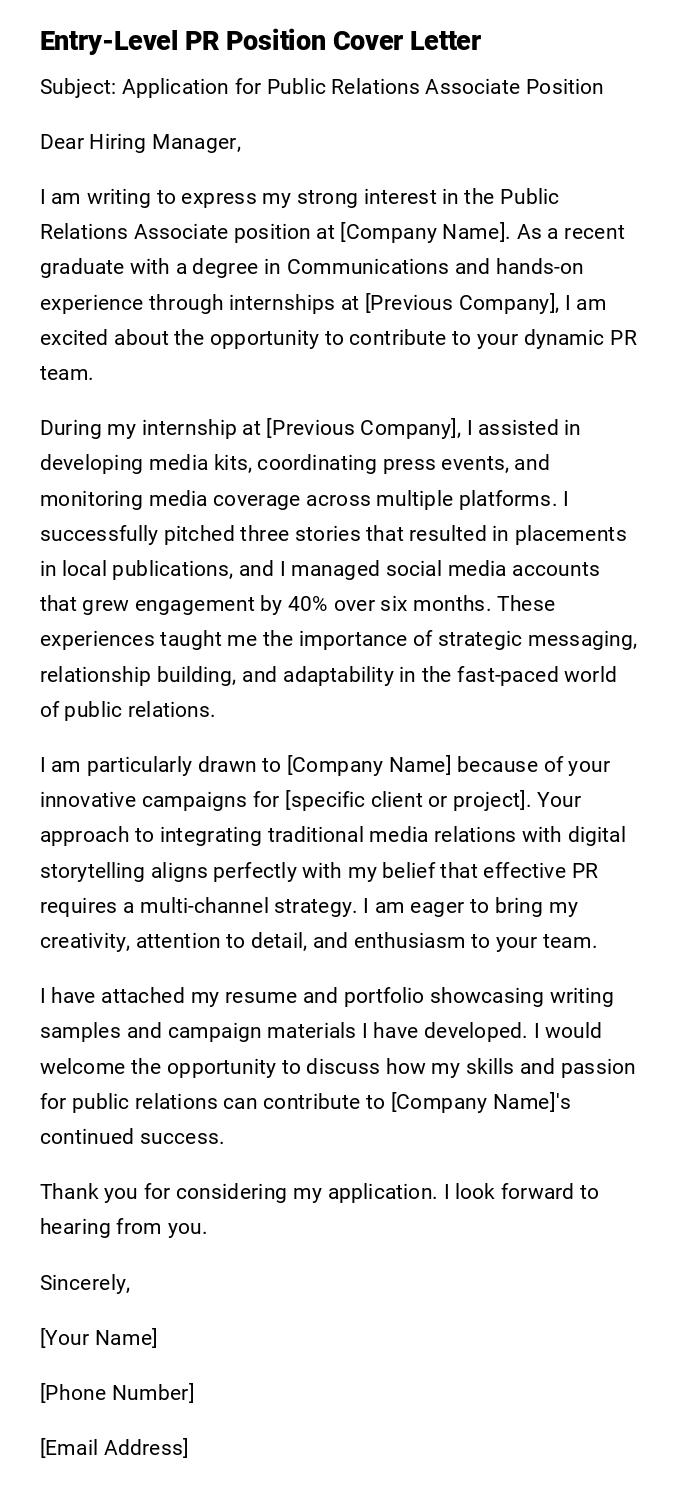
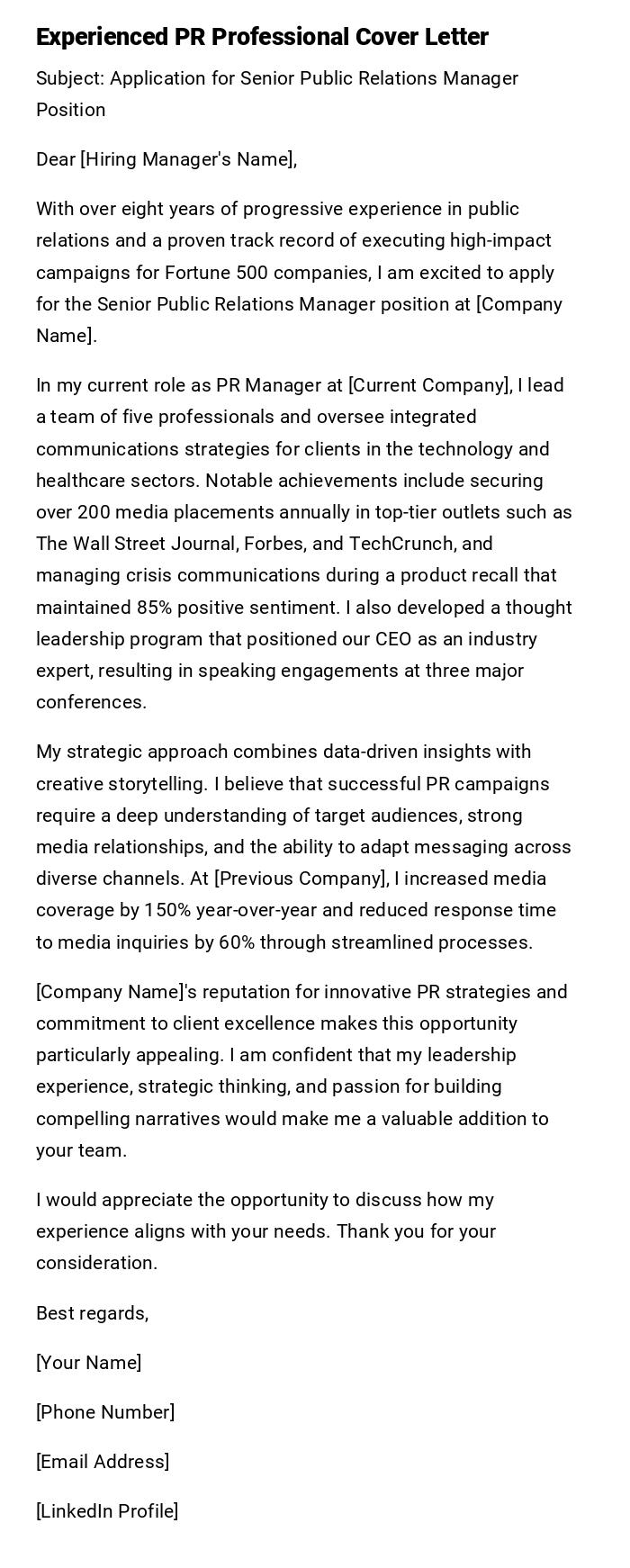
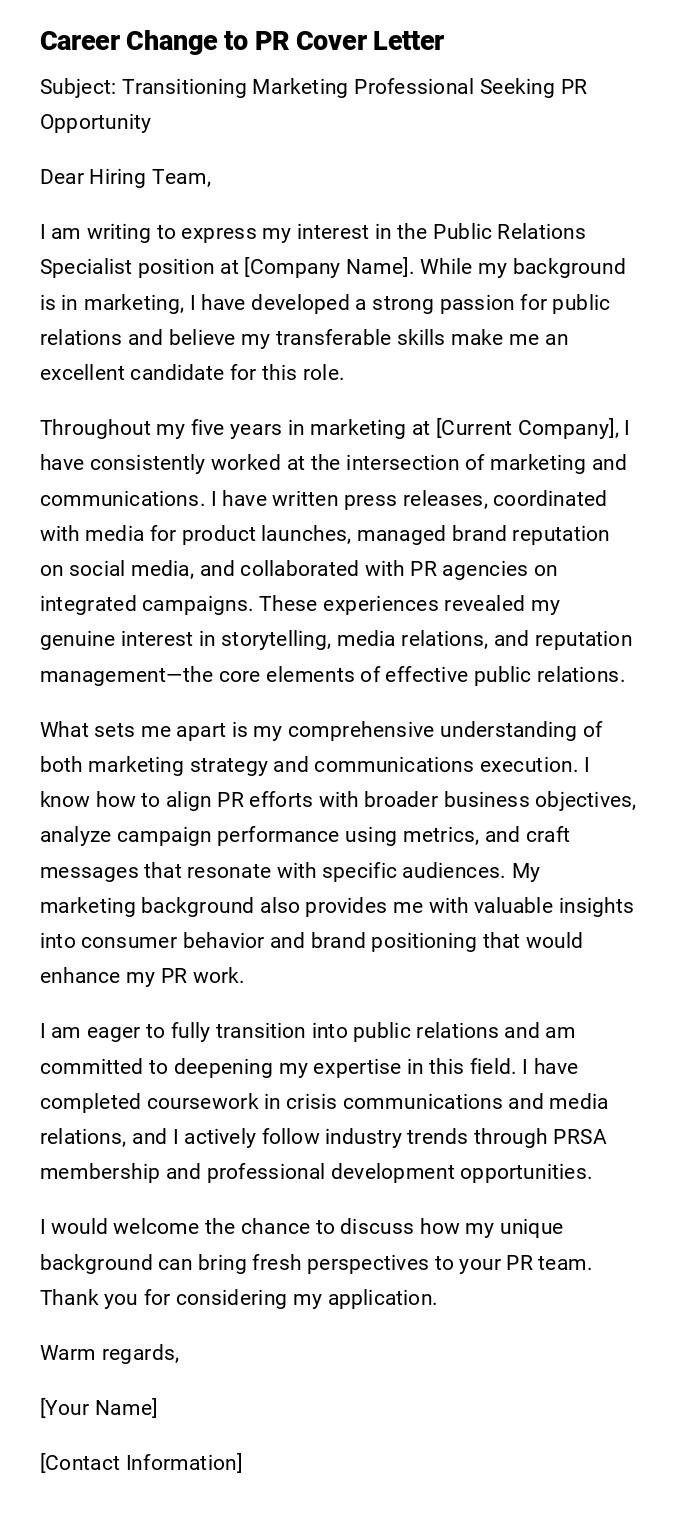
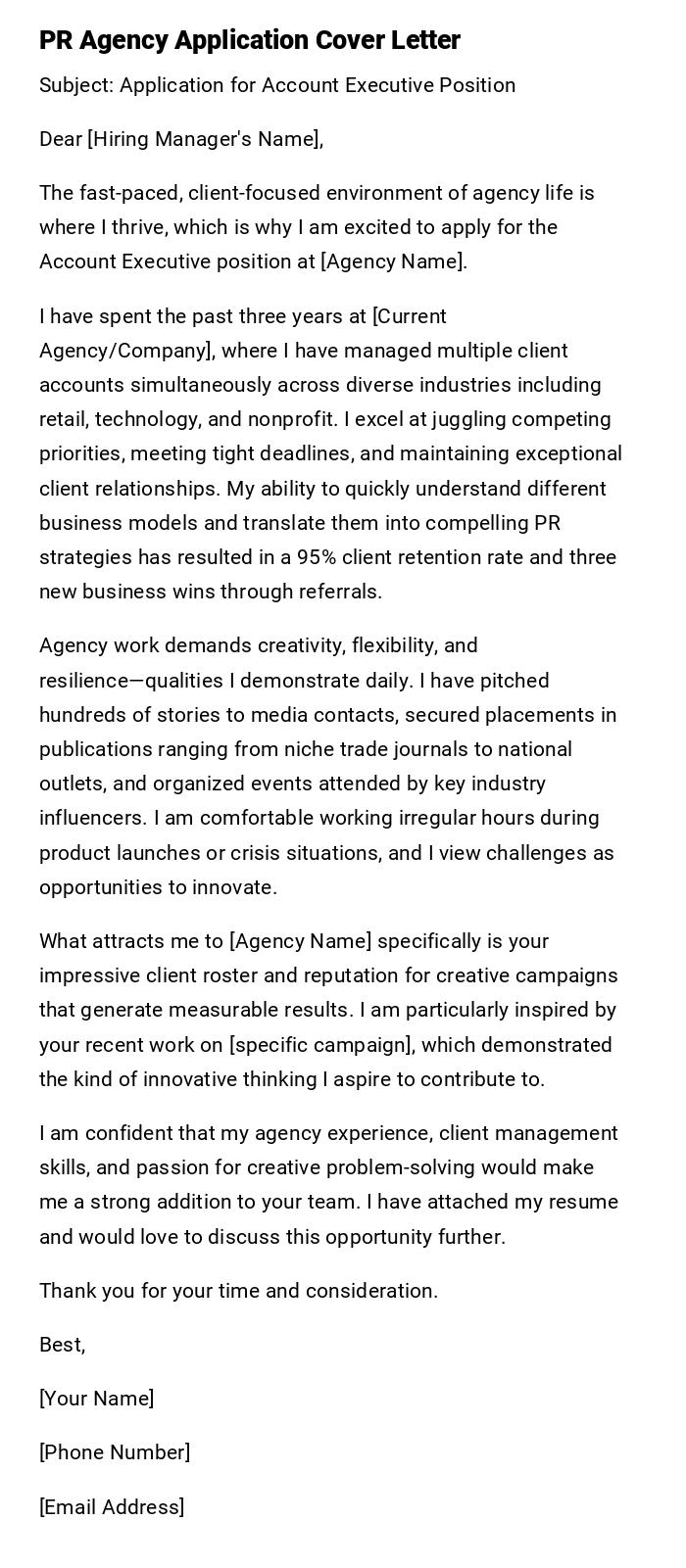
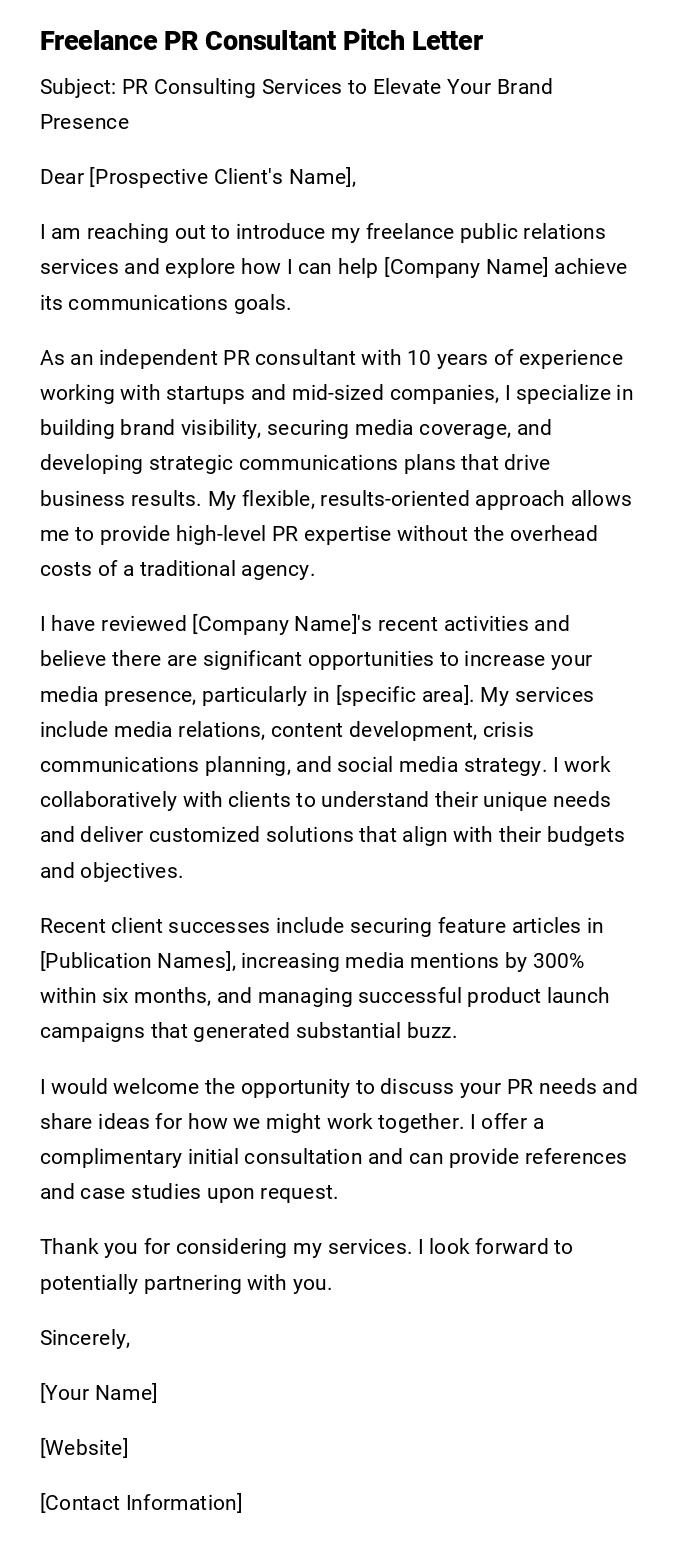
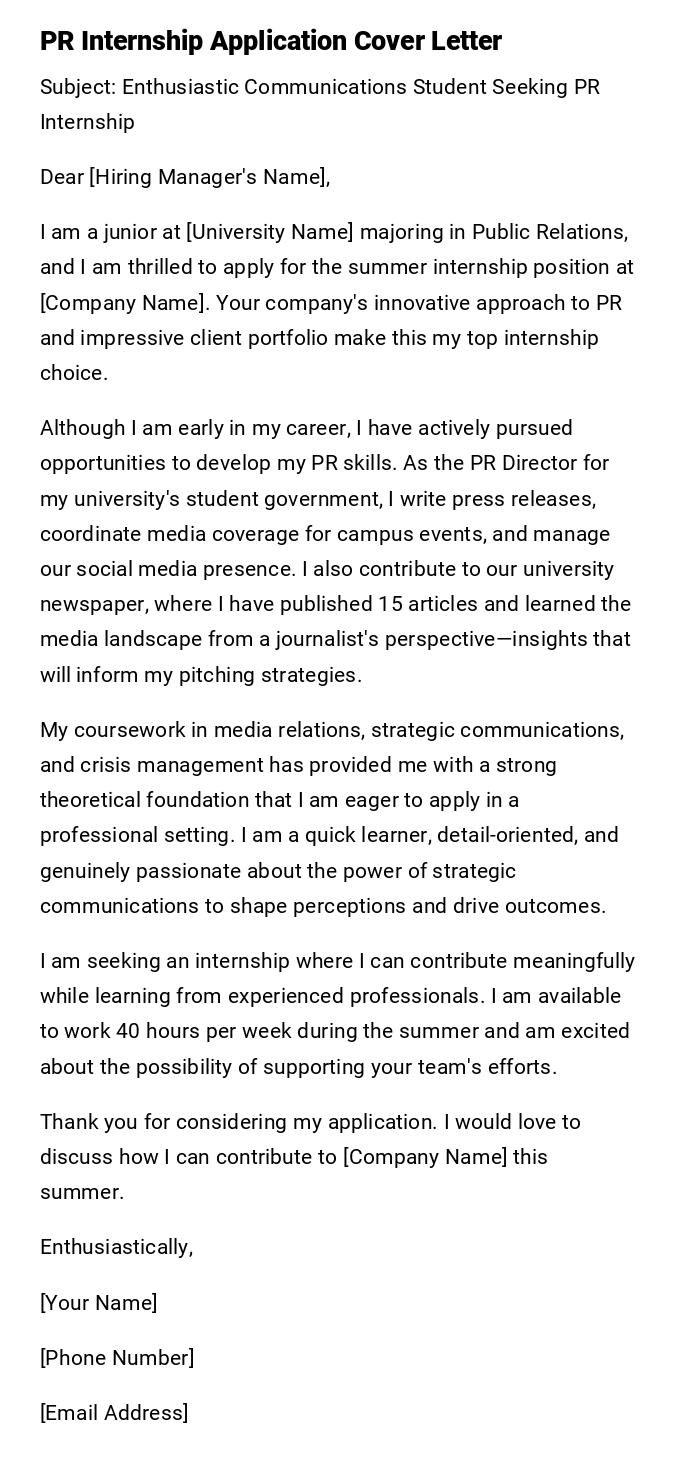
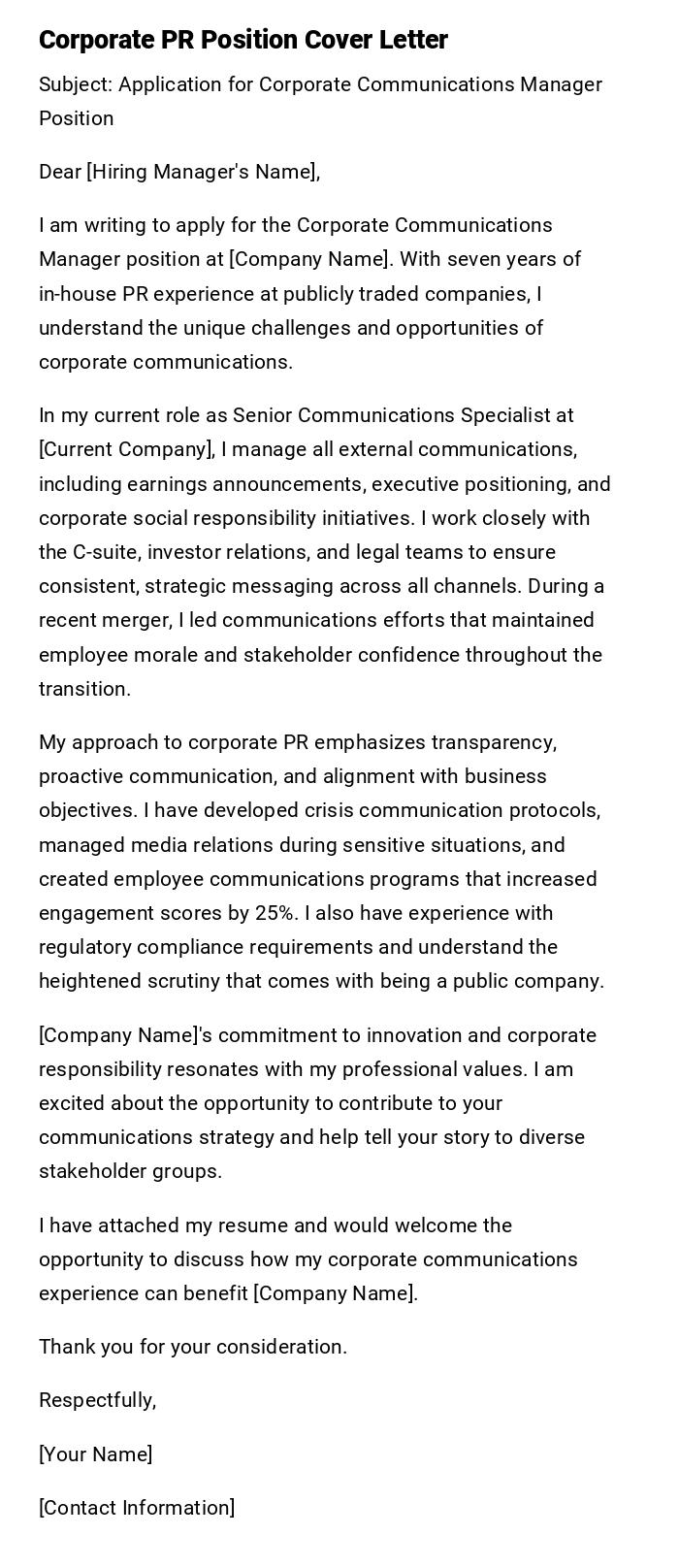

 Download Word Doc
Download Word Doc
 Download PDF
Download PDF